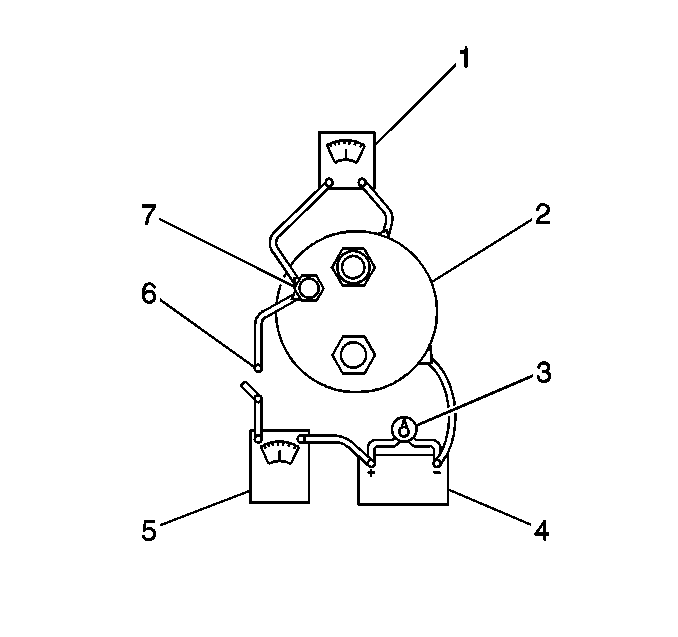Inspect the following starter motor components:
- The drive pinion.
| • | The pinion should turn freely in the overrunning direction and
turn with some degree of resistance in the drive direction. |
| • | Inspect the pinion teeth to see that they have not been chipped,
cracked, or excessively worn. Badly chipped pinion teeth can indicate chipped
ring gear teeth. Replace the flywheel as needed. |
| | Notice: Do not clean the starter motor parts in a degreasing tank. Soaking parts
will dissolve the permanent lubrication and may damage the electrical
insulation. This will shorten starter motor life.
|
| • | The starter drive requires no lubrication, but should be wiped clean. |

- The solenoid hold-in windings
by connecting an ammeter (1) and switch in series with a 12 volt battery
and the solenoid terminal on the solenoid switch.
| 2.1. | Connect a voltmeter (2) to the solenoid terminal and the ground. |
| 2.2. | Disconnect the motor lead from the solenoid and tape the lead
in order to prevent contact. |
| 2.3. | Connect the carbon pile across the battery. |
| 2.4. | Adjust the voltage to 10 volts and note the ammeter reading.
The starter motor reading should be 6-12 A. |
Notice: To prevent overheating of the solenoid pull-in winding, do not leave
the winding energized for more than 15 seconds. The current draw will decrease
as the winding temperature increases.
- The solenoid hold-in windings and the pull-in windings by making connections
as for the previous test.
| 3.1. | Ground the solenoid motor terminal. |
| 3.2. | Adjust the voltage to 10 volts and note the ammeter reading.
The starter motor reading must be 30-45 A. |
| • | The current reading will change as the windings heat up. |
| • | The current draw readings that are over the specifications indicate
shorted turns or a ground in the solenoid windings. |
| • | The current draw readings that are under the specifications indicate
excessive resistance. |
| • | No reading indicates an open. |

